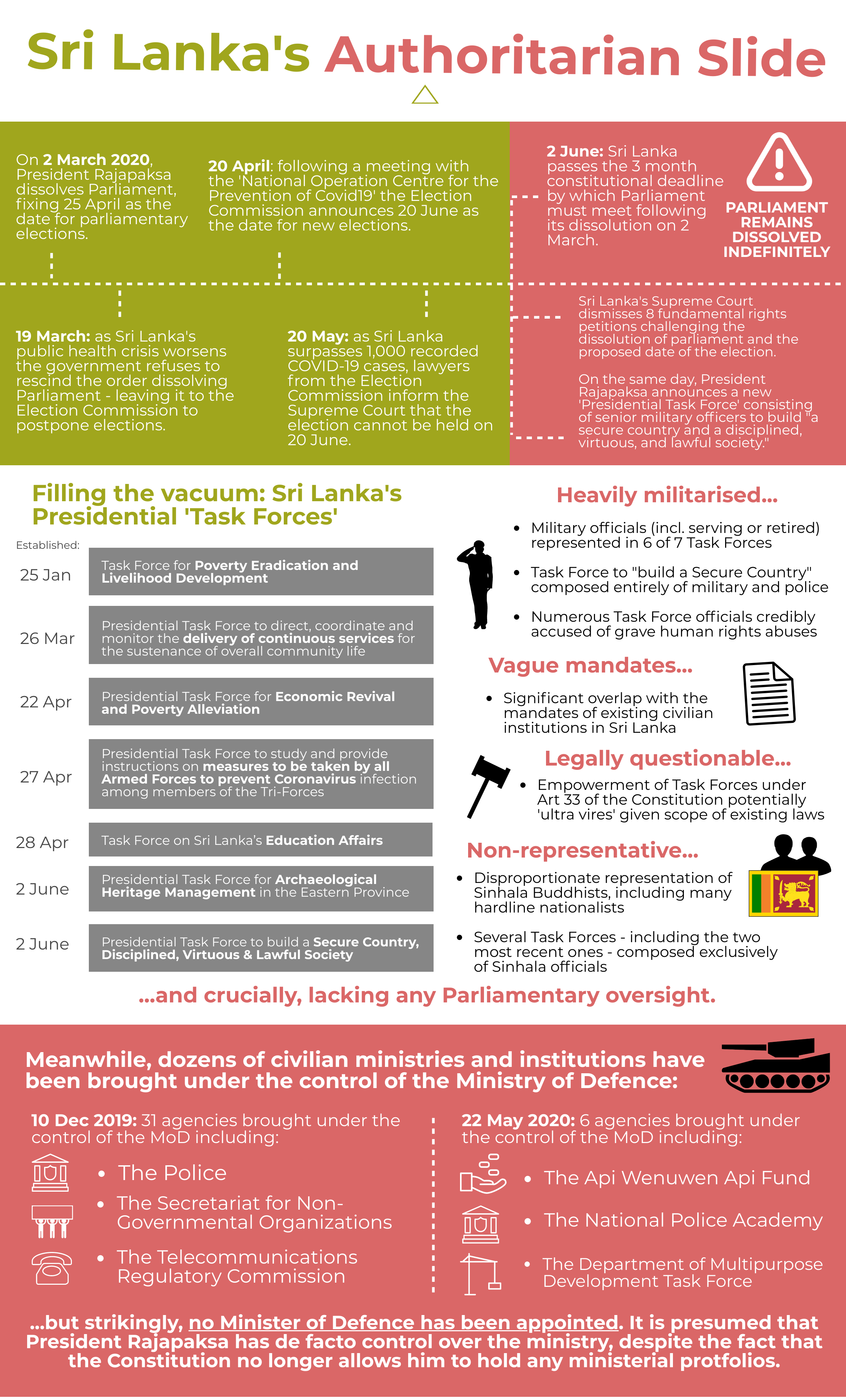
Sri Lanka Campaign for Peace and Justice has released a statement warning against Sri Lanka’s slide into authoritarianism and calling for the international community to push back against the increasing militarisation of Sri Lanka.
Noting this turn to authoritarianism, Sri Lanka Campaign highlights continued unconstitutional executive rule of the administration, the establishment of Presidential Task Forces, and the aggressive state-sponsored “Sinhalisation” of traditional Tamil and Muslim provinces.
Unconstitutional rule
On 2 March, Sri Lanka’s parliament was dissolved and has not reconvened within the three month-period permitted by the Constitution. The 2 June, marked this three-month period and the government has not entered a “period of unconstitutional executive rule”.
Whilst Sri Lanka’s parliament was initially planned to reconvene on 25 April, this had been delayed due to outbreak of the coronavirus, President Gotabaya Rajapaksa has since refused to reconvene parliament, and has prevented scrutiny of his administration.
On the 2 June, the Supreme Court also dismissed a number of cases which challenged the dissolution of parliament and the date set for the new election, 20 June. The Supreme Court has yet to publish their reasoning for this.
Sri Lanka’s Election Commission has raised concerns over the set date, 20 June, as an election could not be held until ten weeks after health officials had declared conditions safe. The Chairman of the Election Commission has announced that a new date will be announced by the 12 June but it seems that this will likely be after mid-August meaning that Sri Lanka would not have had parliamentary rule for almost 6 months. The 5 August has been proposed as the date for fresh elections.
Presidential Taskforces
Whilst parliament has been prevented from convening, the Rajapaksa administration has bypassed democratic checks and established all Sinhala task forces which are headed by accused war criminals.
Since coming to power in November, President Rajapaksa has established seven Presidential Task forces which bypass parliamentary scrutiny. These task forces have been widely criticised by civil society actors and human rights activists as they are extraordinarily broad, and they have vague powers many of which overlap with existing civilian agencies. This raises concerns over transparency and accountability as challenging the decisions of the task force increasingly difficult.
Read more here: Sri Lanka’s Presidential Task Force threatens rule of law – International Commission of Jurists
The Sri Lanka Campaign warns:
“With Sri Lanka’s Parliament in a state of suspense, these military-dominated Task Forces are filling the gap, providing President Rajapaksa with a means of centralising power and governing with minimal oversight. While militarisation and the centralisation of power are not new phenomena in Sri Lanka, the concentration of key posts directly in the hands of the military and intelligence officials is unprecedented”.
Sinhalisation
The appointment of a separate task force to manage “Archaeological Heritage” in the Eastern Province has also given reason to further concerns. This task force is also headed by an all Sinhala committee as well as many military figures accused of war crimes.
The only religious leaders on the task force are Buddhist monks with a record of promoting aggressive state-sponsored ‘Sinhalisation’ in Trincomalee district at the expense of Tamil and Muslim communities. Tamils and Muslims make up three-quarters of the population in the Eastern Province and there are numerous issues with the land as the military continues to occupy stolen land.
Read more here: Sri Lankan president pledges military will protect Buddhist sites in east
Pushing back
Stressing the need for the international community to push back, Sri Lanka Campaign highlights that the dissolution of parliament and crackdown on dissent has made internal dissent even more precarious.
Sri Lanka Campaign also notes that Sri Lanka is a member of the Commonwealth which have pledged to uphold the rule of law and human rights. Failure to uphold these principles enables the Commonwealth Secretariat and Ministerial Action Group (CMAG) to discuss “situations of concerns” and to take action, including the suspension of membership where appropriate.
Sri Lanka Campaign also notes the debt crisis Sri Lanka is facing. The government is unable to approve new loans without parliamentary oversight. Sri Lanka Campaign urges the international community to stress that they will not offer to approve further credit until Sri Lanka’s parliament has approved a new budget and increased the debt ceiling. Sri Lanka Campaign stresses this should be a bare minimum.
They also encourage forms of development assistance such as emergency support to civilian agencies which can help with the threat of the coronavirus and ensure that ordinary Sri Lankans are not penalised.
They conclude stating:
In the early stages of Gotabaya Rajapaksa’s Presidency, the international community waited and watched to see how this new President would behave, despite repeated warnings from human rights groups about the need for a much tougher stance. It is now quite clear that the President is putting his vision of a centralised, militarised, Sinhala Buddhist Sri Lanka into action – fuelling a palpable sense of fear among the country’s minority Tamil and Muslim communities. Democratic institutions in Sri Lanka such as the Parliament and the Supreme Court have proven unable to halt this slide towards authoritarianism. It is time for the international community to step up.
Read Sri Lanka Campaign’s full statement here.
We need your support
Sri Lanka is one of the most dangerous places in the world to be a journalist. Tamil journalists are particularly at threat, with at least 41 media workers known to have been killed by the Sri Lankan state or its paramilitaries during and after the armed conflict.
Despite the risks, our team on the ground remain committed to providing detailed and accurate reporting of developments in the Tamil homeland, across the island and around the world, as well as providing expert analysis and insight from the Tamil point of view
We need your support in keeping our journalism going. Support our work today.
For more ways to donate visit https://donate.tamilguardian.com.

